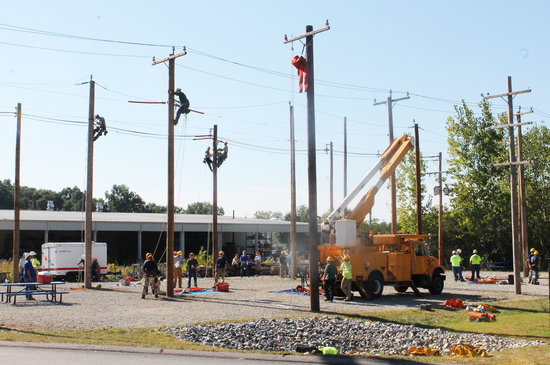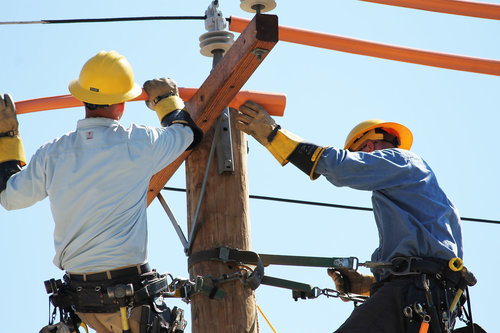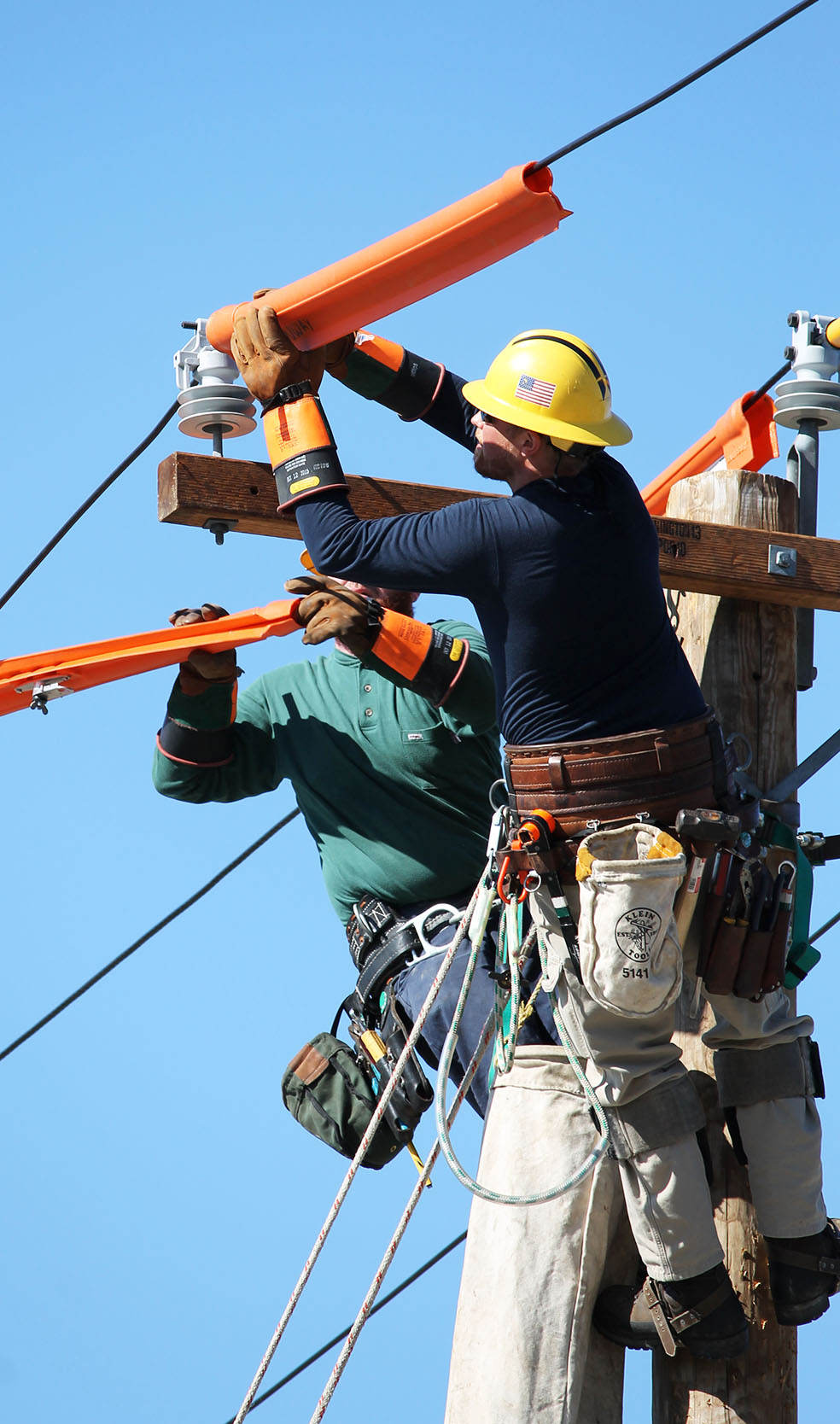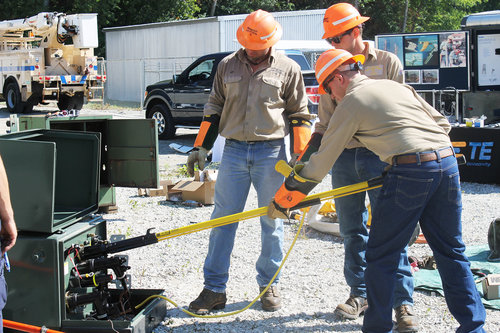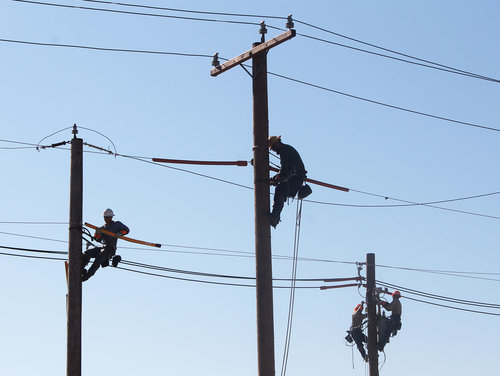NEPPA eNewsletter
October 2015
|
The 9th Annual NEPPA Lineworker's Rodeo was held on September 17, 2015, at NEPPA in Littleton, Mass. Modeled after the International Lineworker's Rodeo, the competition is meant to display the craft of line work, with three person lineworker teams representing their respective utilities. The competition involves teams competing in a variety of line events with an emphasis placed on safety and the technical skills needed in line work. Teams can receive deductions in their scores based on violations determined by judges such as misuse of tools, unsafe work or slipping while climbing the pole. Final scores are determined after any deductions in scores and event times are used only as a tie breaker.
This year the event included 11 teams representing nine different utilities from Massachusetts, Connecticut and New Hampshire. The utilities represented were Braintree, Groton, Groveland, Hingham, Mansfield, Middleton, New Hampshire Electric Cooperative, Norwich CT and Peabody. The competition events for this year were determined by a committee of utility representatives and were meant to represent real-life situations that the lineworkers may encounter while out in the field. The six events were 4kV crossarm changeout, 4kV isolation event, hurtman rescue, obstacle course, transformer changeout and URD terminator changeout. To see the top three teams for each event and overall winners please click here!
We would like to thank all the judges, sponsors and volunteers who are involved with the rodeo as, without your time, efforts and sponsorships, the rodeo would not be possible!
We were also fortunate enough to expand the rodeo to 11 teams this year, and are hopeful to continue to grow this prestigious event. So, if you or anyone at your utility has any interest in participating in this event next year, we encourage you to do so!
Thank you!
Ken Stone,
Rodeo Committee Chair
##SHARELINKS##
|
|
Overall Winners:
1ST PLACE 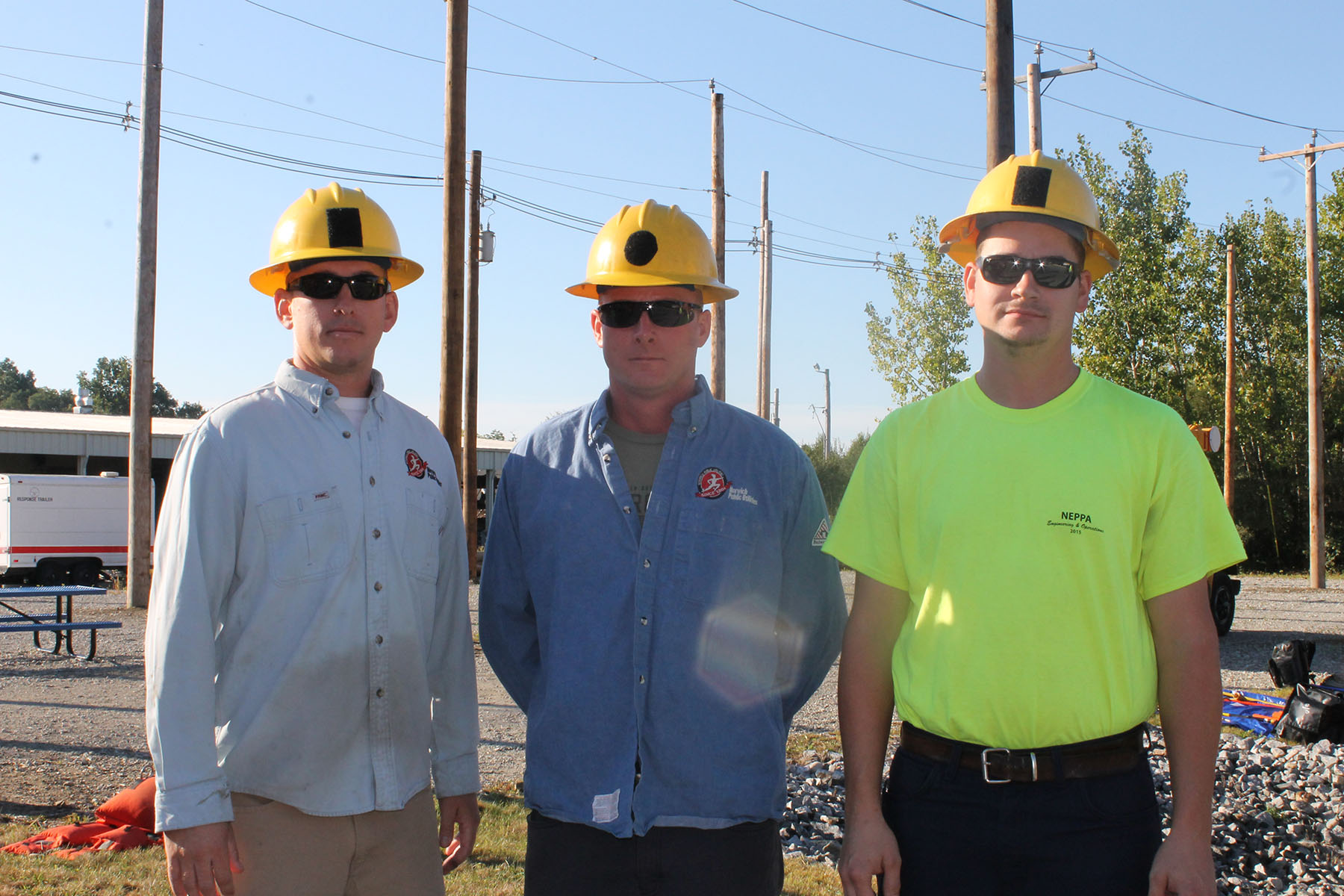 2ND PLACE  3RD PLACE  Category Winners: Groton Electric Light  Winners of the following: 3rd Place - 4kV Isolation Event 1st Place - URD Terminator Changeout 2nd Place - Overall Groveland Municipal Light Department
 Winners of the following: 2nd Place - 4kV Crossarm Changeout 2nd Place - Hurtman Rescue Middleton Municipal Electric Department  Winners of the following: 1st Place - 4kV Isolation Event 3rd Place - Hurtman Rescue 2nd Place - Transformer Changeout 2nd Place - URD Terminator Changeout 3rd Place - Overall New Hampshire Electric Cooperative  Winners of the following: 3rd Place - Transformer Changeout Norwich Public Utilities Team One
 Winners of the following: 2nd Place - 4kV Isolation Event 2nd Place - Obstacle Course Norwich Public Utilities Team Two  Winners of the following: 1st Place - 4kV Crossarm Changeout 1st Place - Hurtman Rescue 1st Place - Obstacle Course 1st Place - Transformer Changeout 1st Place - Overall Peabody Municipal Light Plant Team One 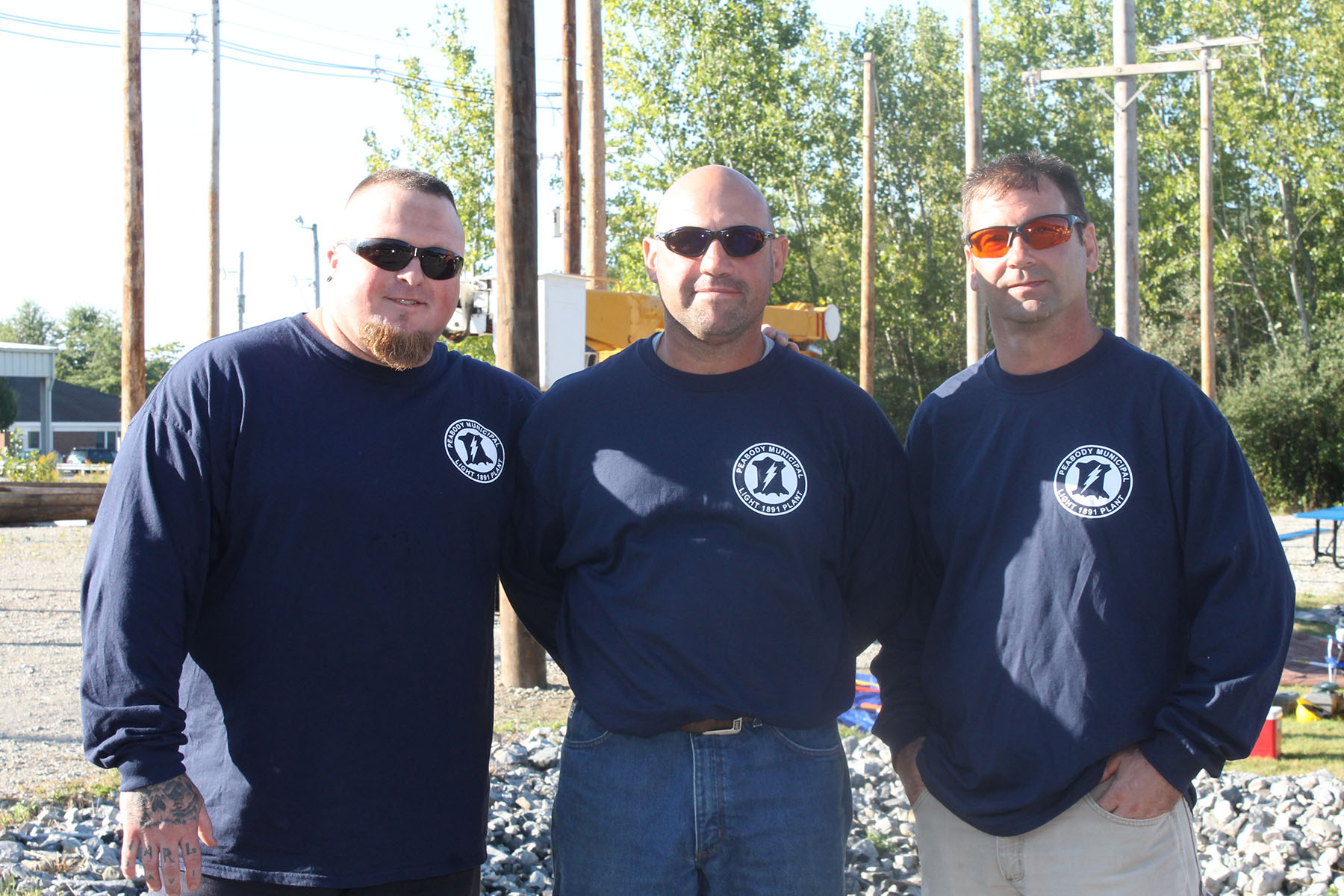 Winners of the following: 3rd Place - Obstacle Course 3rd Place - URD Terminator Changeout Peabody Municipal Light Plant Team Two 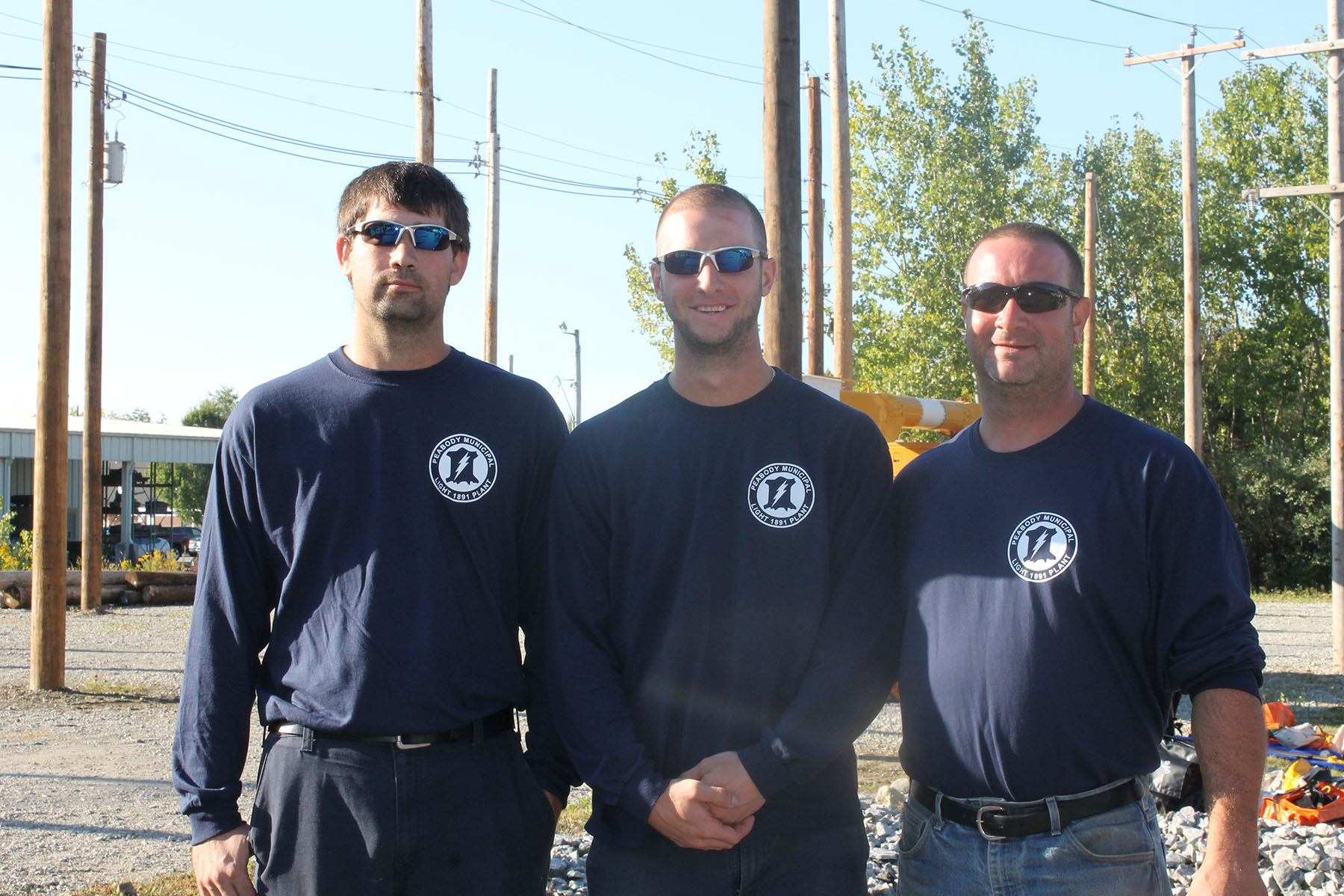 Winners of the following: 3rd Place - 4kV Crossarm Changeout ##SHARELINKS##
|
EXECUTIVE DIRECTOR'S REPORT
 On behalf of the NEPPA Executive Committee, I am excited to announce the appointment of David F. White, Esq. of Worcester, Mass., as NEPPA’s Executive Director. On behalf of the NEPPA Executive Committee, I am excited to announce the appointment of David F. White, Esq. of Worcester, Mass., as NEPPA’s Executive Director.The Executive Committee undertook a thoughtful and extensive national search, using the services of the executive recruitment firm, Dacri & Associates, LLC. Throughout the spring and summer, the Executive Committee conducted multiple interviews on an exceptional pool of candidates before hiring Mr. White on October 1. David comes to NEPPA from the Massachusetts Dental Society, where he was the Director of Government Affairs and Client Services. David has extensive association experience, is a Certified Association Executive (CAE) and a registered lobbyist, with wide-ranging experience in government affairs, strategic planning and development of educational programs.
David received his B.S. in Political Science from Northeastern and Master's and Juris Doctor from Suffolk University Sawyer School of Management and Suffolk Law School, respectively.
Mr. White’s start date is November 2, 2015, and some of his initial objectives include meeting the membership, continuing to coordinate NEPPA’s OSHA Certification and developing short and long term goals and objectives with the Board. His will formally address the organization at the Annual Membership Meeting on Friday, November 13, at the Chocksett Inn, Sterling, Mass.
I look forward to working with David and transitioning for the first two weeks of November, leaving the organization to his and staff’s capable hands at the conclusion of the Annual Membership Meeting.
Please join me in congratulating and welcoming David to our organization.
Best Regards,
Savas
Savas C. Danos
Interim Executive Director
##SHARELINKS##
|
AROUND NEW ENGLAND
|
For the second time in two months the Houlton Water Company (HWC) has garnered another prestigious honor. Per correspondence from New England Water Works Association (NEWWA) executive director Ray Raposa dated August 6, 2015, it was announced HWC shall receive the 2015 New England Small (less 10,000 population) Utility of the Year award. HWC is one of more than 200 small utilities that are members of NEWWA. The honor recognizes HWC for water system improvements, customer service, staff training and excellence in water operations. Previously in mid-June of this year, HWC received the Maine Water Utilities Association Excellence in Operations award.
Established in 1882, NEWWA is a non- profit organization incorporated in the state of Massachusetts. The association is the New England authority on education, training opportunities and public outreach to protect and improve drinking water and operations.
Although the Utility of the Year award focuses on the outstanding work of water operations supervisor Brian McGuire and staff of Kenneth Gonya, Thomas Rouse and Matthew Lincoln, it also recognizes the commitment of our customer service department consisting of supervisor Jane Lynds and staff Nancy Williams, Elsie Jones and Kelsey Fitzpatrick. The honor distinguishes as well all HWC personnel and directors. Employees in the wastewater and electric departments contribute positively to any success we have in water operations and customer service. In addition, a competent board of directors assures HWC has the necessary policies and financial and human resources available to provide quality drinking water for the community. Without all HWC personnel and directors working cooperatively and serving the best interest of our customers, the HWC would not have been selected for the NEWWA honor.
##SHARELINKS##
|
|
The MWUA held its bi-annual meeting at the Houlton Lodge of Elks club on June 11, 2015. The MWUA is a non profit membership organization established in 1925 to represent the water utility membership in the Legislature, policy proceedings, regulatory environment and networking. In addition the MWUA provides training to all its member systems. The Houlton Water Company has been a member since the inception of the MWUA,
During the June MWUA meeting the Houlton Water Company (HWC) was the proud recipient of the MWUA Excellence in Operations award. The award recognizes outstanding performance where a team effort has coordinated to excellence in the following areas:
The Excellence in Operations award is an honor to the HWC water department ably supervised by Brian McGuire and assisted by Kenneth Gonya, Thomas Rouse and Matthew Lincoln. In addition, all HWC personnel from all departments have contributed to the achievement of this Excellence award.
##SHARELINKS##
|
|
Municipal utility members of the Massachusetts Municipal Wholesale Electric Company (MMWEC) have another tool to contain their costs and pass on the savings to consumers.
Under an agreement between MMWEC and Tangent Energy Solutions, MMWEC members can reduce their capacity and transmission costs -- the fastest growing power cost components -- while individual customers also save money and conserve energy.
"The Tangent program is a win-win for municipal utilities and their customers," said MMWEC Chief Executive Officer Ronald C. DeCurzio. "It’s an important addition to the suite of MMWEC services that complements our other initiatives to deliver stable and competitive power prices for our member utilities," he said.
Tangent’s Peak Management Program and related "Demand Design" services will enable MMWEC’s municipal utility members to contain their transmission and capacity costs, both of which are based upon the peak hour usage for a given municipal utility.
Tangent’s Distributed Energy Resource Management System (DERMS) technology anticipates peak electricity usage times and signals customers to reduce usage during those times. Instrumentation is installed at customer meters so that customers can see their "load profile" in real time. Customers will be provided with load reduction strategies during periods of alert. Conserving energy during these hours will reduce costs for individual customers while also reducing the utility’s peak hour usage, which helps mitigate rising capacity and transmission charges.
Tangent’s technology targets transmission and capacity charges that can represent 20 percent or more of customers’ annual energy bills. Utilities will pass along a portion of the transmission and capacity savings to customers as an incentive for participation. Customers will see the savings applied as credits on subsequent utility bills. Customer participation is voluntary. MMWEC will monitor and verify Tangent’s data and savings calculations on behalf of participating members.
Tangent’s Peak Management Program and "Demand Design" services augment the array of programs and services offered by MMWEC to control electricity costs. MMWEC’s Power Portfolio Management program provides structured analyses of each member’s current and future resource mix, including generation, power contracts and other resources. Through this program, MMWEC identifies, quantifies and mitigates risk, and promotes resource diversification and portfolio optimization. Fuel input prices, forward power markets and resource utilization rates are also monitored in order to stabilize and/or reduce power supply costs.
In addition, MMWEC employs regulatory and legal strategies for the benefit of municipal utilities and their customers, such as the ongoing litigation that is reducing the amount of profit transmission owners are allowed to earn on their investments in New England transmission facilities.
MMWEC also leverages its unique ability to finance and own energy assets, including power plants and transmission facilities, offsetting capacity and transmission expenses for the benefit of its members.
MMWEC is a non-profit, public corporation and political subdivision of the Commonwealth of Massachusetts that provides a variety of power supply, financial, risk management and other services to the state’s consumer-owned, municipal utilities.
##SHARELINKS##
|
|
A major credit rating agency has affirmed the A+ credit ratings of Massachusetts Municipal Wholesale Electric Company (MMWEC) power supply projects, citing the "solid credit quality" and improving rate competitiveness of MMWEC and its municipal utility project participants.
The ratings affirmation by Fitch Ratings reflects a strong and improving financial profile for MMWEC, a non-profit, joint action agency that provides services to the Commonwealth’s consumer-owned municipal electric utilities.
"MMWEC is in solid financial shape and the metrics will be improving as we move toward retirement of our existing debt by 2019," said MMWEC Chief Executive Officer Ronald C. DeCurzio. "We are in a strong position to take advantage of marketplace opportunities that will further improve the competitive position of MMWEC’s member utilities," he said.
According to Fitch, key drivers in its ratings decision include MMWEC’s standing as a low-cost wholesale power provider as well as the strong financial condition and competitive rates of MMWEC’s project participants. The rating agencies base their ratings of MMWEC largely on the financial condition of project participants.
"Participant rates remain competitive compared to other utilities in the state and ... should improve further following the repayment of the nuclear project debt," Fitch states. Modest electric system debt and healthy cash reserves also bolster the financial standing of participants, according to Fitch.
Importantly, MMWEC maintains reserve funds that will be sufficient to cover most of its remaining debt following the July 2016 debt payments, which Fitch calls "an added financial cushion" that enhances bondholder protection.
The four rated MMWEC power supply projects and the organization’s $112.5 million in outstanding debt are associated with MMWEC’s ownership in the Millstone Unit No. 3 and Seabrook Station nuclear plants, which are licensed to operate until 2045 and 2030, respectively. Seabrook is seeking an extension of its operating license to 2050.
"The long operating life of these units and relatively short life of related debt significantly enhance the value of these resources," DeCurzio said. "Asset ownership, especially debt-free asset ownership, provides a valuable hedge against increasing capacity and transmission costs in today’s marketplace," he said.
MMWEC sells the output of its nuclear projects to 28 Massachusetts municipal utilities and one Rhode Island utility under contracts that require the utilities to pay their share of project costs, including the debt service on MMWEC bonds.
MMWEC’s project participants include Massachusetts municipal utilities based in the communities of Ashburnham, Boylston, Braintree, Danvers, Georgetown, Groton, Hingham, Holden, Holyoke, Hudson, Hull, Ipswich, Littleton, Mansfield, Marblehead, Middleborough, Middleton, North Attleborough, Paxton, Peabody, Reading, Shrewsbury, South Hadley, Sterling, Templeton, Wakefield, West Boylston and Westfield as well as the Pascoag (RI) Utility District.
MMWEC has issued more than $4.7 billion in bonds since 1976 to finance and refinance its 750-megawatt ownership in several New England power plants. All but $112.5 million of that debt has been retired. Bonds that were issued to finance MMWEC’s ownership in the Stony Brook power plant in Ludlow, Mass., and the W.F. Wyman plant in Maine were retired in 2008.
MMWEC is a non-profit, public corporation and political subdivision of the Commonwealth of Massachusetts that provides a variety of power supply, financial, risk management and other services to the state’s consumer-owned, municipal utilities.
##SHARELINKS##
|
ASSOCIATION HAPPENINGS
|
NEPPA welcomes Leidos Engineering, LLC as a corporate member as of Tuesday, September 15, 2015! Leidos Engineering, LLC is advancing intelligent infrastructure to deliver better business outcomes in an increasingly connected world. The company is located at 550 Cochituate Road, West Wing, Framingham, MA 01701. The primary contact person is John E Higgins, Jr. He can be reached at john.e.higgins@leidos.com or 508.935.1600 (phone) or 508.935.1888 (fax). Schneider Electric USA, Inc. became an associate member of NEPPA on Wednesday, September 16, 2015! Schneider Electric USA, sells electrical apparatus and equipment wiring supplies, and construction materials. The company is located at 182 Commerce Street, East Haven, CT 06512. The primary contact person is Tom Ocepek, who is the Service Sales Executive. He can be reached at Thomas.Ocepek@Schneider-Electric.com or 330.208.7562 (phone).
##SHARELINKS##
|
CALENDAR
|
November 18 - 20, 2015 Water's Edge Resort and Spa Westbrook, Conn. For more information or to register, please click here!  ##SHARELINKS##
|
|
December 9 - 10, 2015 NEPPA Training Center Littleton, Mass. For more information or to register, please click here! 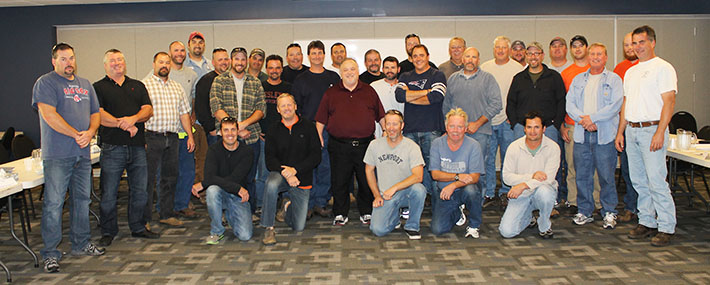 ##SHARELINKS##
|
EDUCATION & TRAINING UPDATE
|
Pete has been a trainer for the Northeast Public Power Association since April 2015 and travels all throughout New England. Before joining NEPPA Pete started as a lineman in May 1984 with Geen Mountain Power. Then he moved over to Burlington Electric in 2002 where he was working line foreman.
Pete has an Associate degree of applied science in Power Technology. He also has his Mass. Hoisting License and will soon be an OSHA instructor.
Pete currently lives in Winooski, Vt., and has been married to his wife, Mary Ann, for the past 30 years. They have two children together, Nathan and Natalie. His hobbies are woodworking and rabbit hunting with beagles.
"Teaching has been a big part of my career and NEPPA gives me a chance to continue teaching, which I love to do!" said Pete.
Keep an eye out for Pete to visit your utility soon!
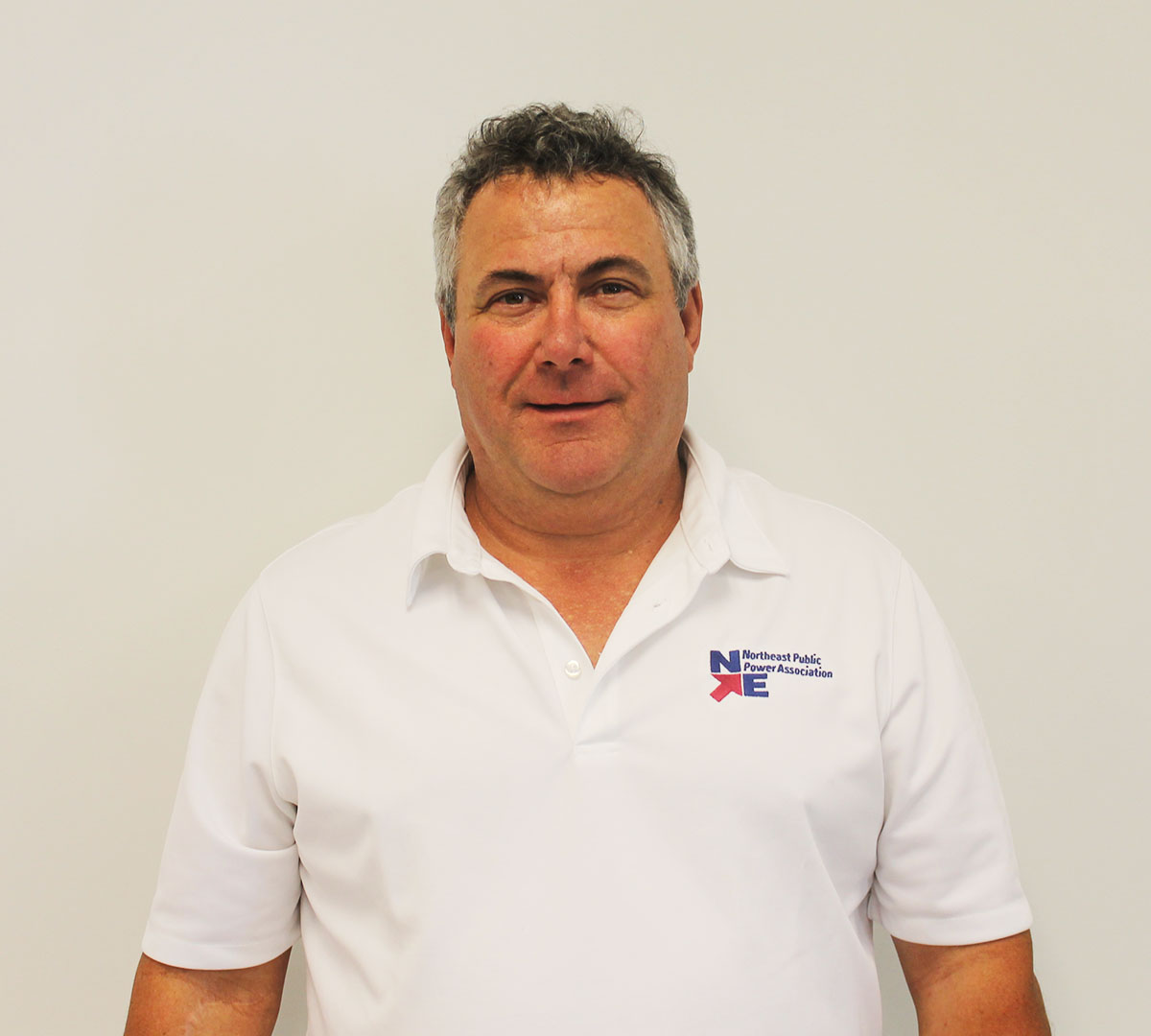 ##SHARELINKS##
|
LEGISLATIVE UPDATE
|
In This Issue:
NEPPA Engages FERC Chair Norman Bay: "Your Position Is Very Similar to Mine"
On Sept. 23, NEPPA Legislative Committee members (Brian Forshaw, CMEEC; Judy Gove, NHEC; and Paul Heanue, Hingham) met with Federal Energy Regulatory Commission (FERC) Chairman Norman Bay and staff.
Since Bay became FERC Chair in April, industry groups have been trying to gauge Bay’s priorities and how he might respond to industry and Congressional pressure. In the meeting, NEPPA learned that Bay was energetic, bright, and focused on consumer outcomes – but is so far swimming against the current at FERC. Hearing NEPPA’s thanks for his favorable positions on consumer issues, Bay joked that he wished his colleagues would vote with him more often.
Bay also agreed with NEPPA that more data and analytic information will help cost-benefit analyses result in "just and reasonable" rates. He knows that New England electric rates are the highest in the U.S. and said he understands how that would affect commercial and industrial customer decisions. On capacity markets, Bay asked, "Why hasn’t public power developed more generation as a result of the capacity markets?" He had thought that perhaps they would act to fill the gaps where merchant generators would not.
NEPPA members explained the risk of having to pay twice if their generation did not clear the market, to which Bay remarked earnestly, "interesting." He asked if the environmental rules were a similar disincentive to build, or if public power might join together to fund a strategically located plant. Forshaw explained that the uncertainty of the market rules was the biggest disincentive to such an investment, and it made more sense to work "behind the meter." Bay understood that logic, but it appeared to be news that the rules were such a hindrance.
When given the opportunity to ask questions of the group, Bay said, "I thought public power initially supported the move to competitive markets – what happened?" Forshaw explained that public power, including NEPPA, supported competitive wholesale markets and still does, but as market rules began tipping in favor of generators at the expense of consumers, they began to have problems.
Toward the conclusion of the meeting, Bay said, "Your position is very similar to mine. Markets can have benefits but the rules must be well-designed." NEPPA plans to follow up with an invitation to visit the region, as well as a similar outreach to new Commissioner Colette Honorable, who may be an ally for Bay.
To read the complete legislative update including the following topics, click the links below:
##SHARELINKS##
|
OPINIONS & EDITORIALS
|
Governor Charlie Barker has started talks with legislators on two proposals in the hopes to save Massachusetts customers a few bucks on their electric bills. To read more about these two proposals, please click here. ##SHARELINKS##
|
|
Interview by Courtney Crouse, NEPPA Communications Manager, with Ellen Burt, General Manager – Stowe Electric Department and Carol Robertson, General Manager – Village of Hyde Park Courtney: Thank you for taking the time from your busy schedules to allow me to interview you on your achievements and cooperative relationship. What made you want to get into this industry? How long have you been the GMs? Carol: Thirty-one years ago, I began my electric cooperative career in Georgia in an administrative management position, which included all inside functions, plus meter reading. In that first year, primarily because of member discontent with the GM, just about everybody began to leave, from the Board to senior staff. I tried to hold everything together. In 1987, I became the General Manager at a difficult time and with much to do to right the ship. It was a very fast growing cooperative. My experience goes back to the days when Enron wanted to take over cooperatives. Those were interesting times. As is today!
Courtney: Were you happy with the opportunity?
Carol: I was delighted and scared. I realized I needed to do well, so I did. This opportunity helped get my children through college and eventually allowed me to go to a much larger cooperative. After retiring, I discovered that I was actually not ready to retire. I decided to go somewhere new and different. Ellen recruited me and when she said come, I came to Vermont! I love my little Village of Hyde Park. We are responsible for the electric department (2nd smallest in Vermont) water, sewer, sidewalks, parks, planning and zoning. We promote business development, but it is a challenge for a small Vermont system. The cost of power is probably the biggest challenge - because commercial rates are high, so you have to be creative, just to keep parity is hard.
Ellen: This is because all electric utilities (IOUs, municipal and Co-ops) are regulated. Vermont is the only regulated state left in New England.
Carol: I was used to a very dynamic competitive, customer-choice environment in fast growing Georgia where you could develop rate structures rapidly and large new customers could choose their power supplier. In Georgia, electric cooperatives are not under rate regulation by the Public Service Board. The Board makes rate decisions. So, it’s been fun in the Village and almost a total career change, total lifestyle change.
Courtney: How long have you been the General Manager of Hyde Park?
Carol: Two years August 1. I’ve survived two winters! It didn’t bother me.
Now Ellen, your turn!
Ellen: Well, I’ve been working for Stowe Electric Department for 20 years. I started as the controller in 1995, and then in ‘99, I was offered the Assistant Manager position because the Manager who had been with Stowe Electric for 15 years was retiring. I took over as General Manager in 2004 and that was a real challenge because at that time the utility was not managed to its potential. There was discussion of selling the utility because it did not have the best reputation with the Town.
Carol: Let me interject, you will find that when a utility breaks down they often go to a woman. I have noticed that state-to-state, utility-to-utility. When it needs to be fixed and they’re totally demoralized and they don’t know what to do...
Ellen: They certainly did that with Green Mountain Power, the only IOU now in the State of Vermont.
Courtney: Why do you think that is?
Carol: Women have certain skills.
Ellen: Yes, get it done; make it right, we can multitask better. Women sometimes are more creative at finding solutions.
Carol: ... and it’s also the ability to take the stress and deal with the people. It’s the people issues that are the most difficult.
Ellen: Yes. When I was first hired there were challenges, especially the threat of being sold. I have a business and accounting background and until then had only worked in professional environments. So I worked very hard and implemented new procedures. And over the years I improved the staff dynamics and hired people with a passion for their jobs. My management style is definitely out-of-the-box and forward-looking.
One of the greatest challenges was definitely the transmission line project into Stowe. When I became the Assistant Manager in 2004 I was assigned to this project, a transmission line that was recognized to be upgraded 30 years prior to 2004. The project was originally estimated to cost $8 million and ended up with a price tag of $40 million. Stowe ended up disputing the cost allocation before FERC for almost two years. Stowe banded together with the other municipals and worked toward a settlement at FERC that was, I believe, for the benefit of all the Public Power systems in Vermont.
Ellen: Shortly afterward, the Village of Hyde Park contacted us because they were in difficult financial shape. And because of their size, I offered SED’s accounting and management services to them, by contract, for six years.
Courtney: Were you still here at Stowe?
Ellen: I was. After 6 years, I realized I wasn’t doing justice to all of Hyde Park’s needs. I was too busy here (Stowe) and I informed the Hyde Park Trustees that they needed to search for a manager in earnest. When I interviewed Carol I thought she was great, still do obviously, and we work well together because she is the same type of manager I am.
After that, I worked on Stowe Electric’s efficiencies, like installing AMI meters, deploying 3 electric vehicle charging stations, and filing the first EV charging station tariff in the State, using the nationally accepted ChargePoint system.
We have undertaken a great number of projects in the past few years, and then I’ve been able to hire more staff as well. For instance, Carol was talking about how one of the most difficult aspects of running an electric utility in this State is the regulatory process, its rules and regulations. In Massachusetts – one does not have that regulatory pressure and oversight. In Vermont, utilities need a lawyer to negotiate before the Public Service Department (PSD) on their behalf. A utility has to ask the PSD’s permission for just about every single thing, providing countless studies and documentation and therefore spend a considerable amount of money.
We ended up paying our law firm a great deal of money so a couple years ago I decided to hire a young lawyer straight from the Vermont Law School. So these are the kinds of creative planning we have to look at over and over.
We also just finished up the application process for another grant to help us with a PV Project. And early this year, I received a grant from the VLITE Board to install 8 more charging stations in Stowe. Stowe Electric currently owns and operates 3 EV charging stations.
Basically, this year I told my staff for the first time since I was appointed - that I can look at my staff and say we work as a great team! I feel like I finally can look back and say we’re doing really well. I believe in a team approach. Everybody is working really hard, the inside and outside crews. Everyone here is passionate about their job. What more can you ask for as a manager?
Carol: Stowe’s team is great. When your system is small, you seek out someone who has the expertise and the team you need for mutual benefit. I looked at the power resources within the state. In the south, we have the resources to create a big, diverse power mix – but for a small public power community in Vermont – diversity options within the state are an issue. I went to a friend who is a senior renewable resources executive for one of the nation’s largest investor owned utilities and asked for advice. He reviewed our VPPSA power resource report and said "solar is the thing you can do now and do it fast!" Then, with Board and voter approval, we resolved to become a more resilient community and develop local renewable resources. We applied for and received a provisional Clean Energy Development Fund grant for a small solar project. What began as a small solar array, turned into something grand.
First, economics came into play and the solar array needed to be larger. Naturally, I turned to Ellen. To achieve better economies of scale, Ellen and I decided to aggregate two individual projects, using one project developer, one attorney, etc. It made sense to work together - then and now. Shortly thereafter the Vermont RES legislation passed, which made the project even more important to our ratepayers.
Ellen: Act 56 requires 75% by 2032. 10% of that 75% must be met with distributed generation projects. The Vermont Comprehensive Energy Plan establishes a goal (not a mandate) of 90% renewables across all sectors (including home heating and transportation) by 2050. But for Hyde Park, a 1 megawatt solar project is approximately 14% of their power supply and Carol can sell the RECS.
Carol: The project will be 1 megawatt, paid for by electric revenues and with positive cash flow from day one.
Ellen: Our PV is only 2.2% of our power supply so I have to continue to support or build more. I will need three more projects to get to the 10% threshold - but I told Carol maybe I will buy her RECS!
Carol: This is what happens when you find a person/system that you can work with. We turned to Stowe for guidance and support and good things happened. We initially thought we were going to use a PPA and shifted to the Clean Energy Renewable Bonds when they became available.
Ellen: Vermont Economic Development Authority called me and they are really geared towards business development and asked if Stowe Electric had any interest in applying for a virtually 0% interest loan to build solar - called CREBs (Clean Renewable Energy Bonds). I called the two municipal managers I knew were interested in solar (Carol from Hyde Park and Michael Sullivan from Hardwick). Even though Hardwick was using a different PV developer, the three systems applied together. In this program, you have to find a bank that will work with you, and the program is a subsidy through the Treasury Department. It is not like we are receiving the money as a grant - it is basically an almost 0% loan and for Stowe, this equates to a savings of $1.5 million. And we own the project outright, instead of entering into a PPA and then purchasing it from the developer after so many years. After the debt-service is paid off, the solar energy is at no cost.
Carol: We developed the concept of the aggregated solar, meaning that each system individually owns their own solar array while gaining economies of scale by working together. We took that concept to VPPSA so that other systems might join in.
Ellen: People working together is the focus of this work! I think that is the basis of the success of ENE, MMWEC, VPPSA and CMEEC. They work together with their municipal and co-op members and get things done; I’ve seen it through ENE. We collaborate on projects and work together, and as Carol was saying, especially when you are small, that is important. You must find somebody to partner with.
Carol: I think we add value to Stowe Electric. All Vermont electric utilities are small when compared to a national standard. Technology is advancing, allowing smaller systems the ability to become more efficient, resilient and cost-effective than ever before. A new world is opening for the small utility, provided that we have a good team.
Courtney: Is there anything else you have planned for your utility or something you hope to accomplish in the future?
Carol: Oh yes - we have big goals for our systems.
Ellen: Yes, we certainly do!!!
Carol: We are really striving to create the most resilient, efficient, lowest cost and most reliable system, whether it be water, sewer or electric. We will start in one place and where we end up should be better than we planned at the start. If you could come visit in a month from now, you would be surprised what we would be up to, because we don’t always know with all the dynamic changes and opportunities. People working together, who trust each other, and have the same work ethic and integrity is the most important thing.
Ellen: We must all work together to reap the rewards.
Carol: It becomes apparent when together we accomplish tasks, achieve economies of great scale and gain more success that we could have done independently! It takes hard work, patience, trust and time. It can be a complex process but there is a synergy in working together with like-minded people. We have opportunity with many small public power communities in this county including Stowe, Morrisville, Hyde Park and Johnson. And of course Hardwick right over the border in the adjourning county. It is really the only area in the state where it is all public power, which is cool.
This gives us the ability to share resources over and above mutual aid during outages. If we need a utility pole, Don Waterhouse goes to Morrisville Electric and buys from their available stock. One of the first things I did was to go next door and ask Dave Hallquist at Vermont Electric Cooperative, "You have a lot of expertise and technology, can I rely on you, too?" Dave said: Yes, of course! The VEC substation crew is one example of expertise that we simply cannot afford and will continue to need. Stowe Electric performs our annual OSHA line audit and crew inspection. We all try to work together. We have a problem with a regulator and Hardwick offers a solution. With the new RES renewable energy mandates, greater teamwork offers enormous benefits to our ratepayers. When it comes to rolling up your sleeves and getting grants, the cooperatives are at the front of the table with federal money all the time, they have the strongest lobby with NRECA, probably the strongest of any lobby....
Ellen: Absolutely
Carol: The Co-ops are very aggressive, know the playing field and rules and are very effective at obtaining grants and federal resources for their service territories.
Ellen: We can take a lesson from the Co-ops!
Carol: The Municipals don’t appear to have that kind of power. We must learn from the cooperatives and get in the race a lot earlier and more effectively.
Courtney: Thank you Ellen and Carol for your contributions to Public Power and for sitting down with me.
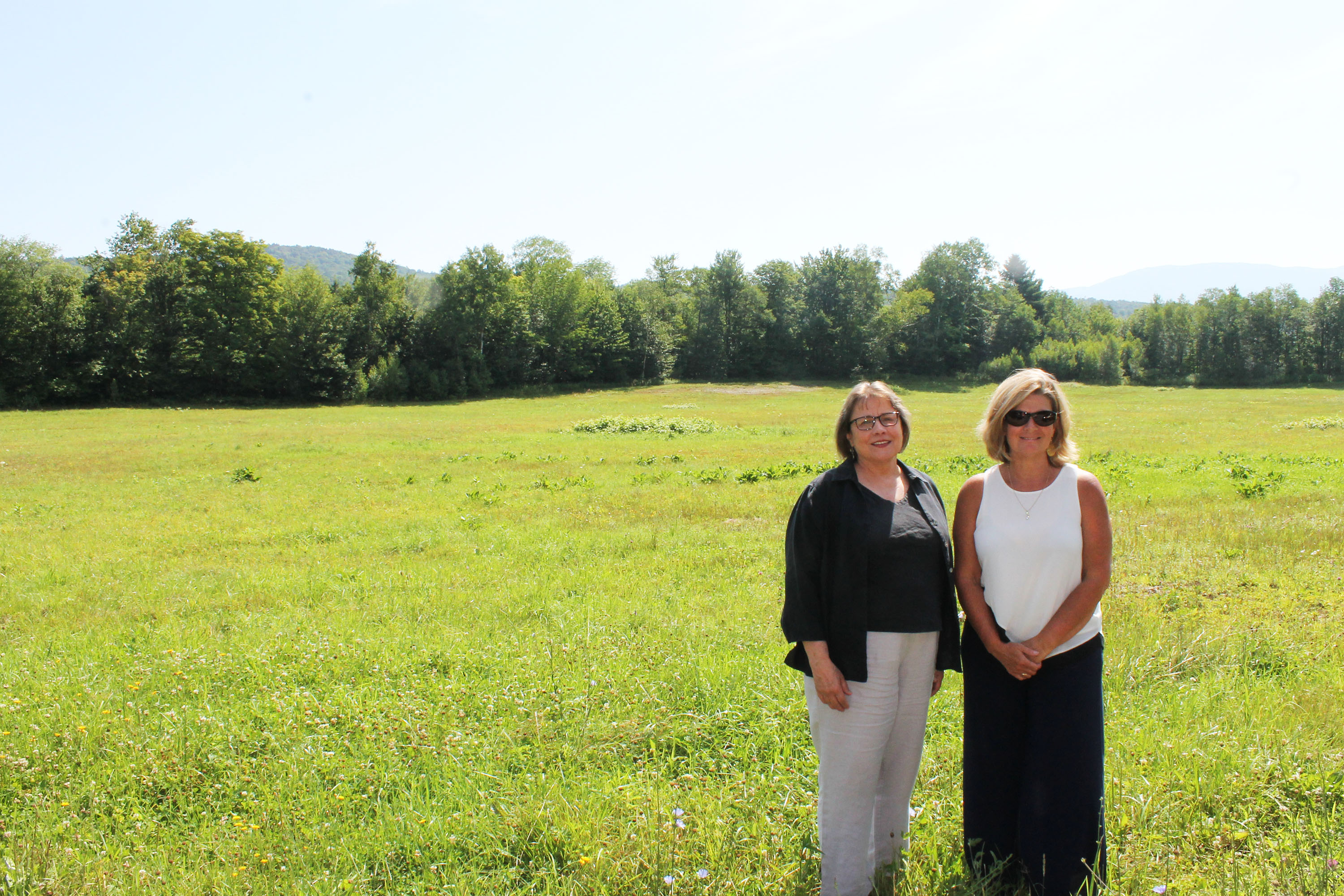 Carol Robertson and Ellen Burt - on location where the solar panels will be installed. ##SHARELINKS##
|
PUBLIC POWER WEEK AROUND NEW ENGLAND
|
Celebrate National Public Power Week with Georgetown Municipal Light Department!
Thursday, October 8, 2015 9 a.m. - 1 p.m. 94 Searle Street Georgetown, MA 01833 Phone - 978.352.5730 info@georgetownlight.com ##SHARELINKS##
|
|
Braintree Electric Light Department (BELD) will celebrate national Public Power Week this year with a special tent at the Braintree Farmers Market on Oct. 3 and a Senior Breakfast on Oct. 6. This annual celebration is observed by more than 2,200 electric utilities that collectively provide electricity on a not-for-profit basis to 43 million Americans. The Farmers Market was held between 9 a.m. and 1 p.m. Saturday, Oct. 3, on the Town Hall Mall. Shoppers visited with BELD staff, who answered questions about our solar energy project and BELD Broadband offerings. Kids picked up a hardhat and explored the bucket truck. There was free apple cider and a "Taste of the Farmers Market" drawing just for Braintree residents.
Back by popular demand -- and in partnership with the Department of Elder Affairs -- BELD will host a Senior Breakfast there Tuesday, Oct. 6. Come to 71 Cleveland Avenue for a delicious meal prepared by members of the Braintree Rotary Club. A BELD representative will provide an overview of what’s new at Braintree Electric, and there’ll be giveaways and drawings as well. Two sittings will be available (8 and 9:30) but seating is limited, so please call the Department of Elder Affairs at 781.848.1963 to make your reservation.
During Public Power Week, BELD honors the democratic tradition of community decision-making and participation that led to BELD’s founding in 1892. "Our customers are an important part of what we do -- not only as consumers, but as owners as well," said Municipal Light Board chairman Thomas Reynolds during a recent meeting with Vice Chair Anthony Agnitti and Secretary Jim Regan. "This is our opportunity to say ‘thank you’ for your continued support."
For more than 120 years BELD has been a nonprofit public power utility owned and operated by the citizens of Braintree. BELD Broadband offers affordable high-speed Internet, cable television and phone service to Braintree residents and businesses.
BELD Day at the farmers market  BELD lineman Dan Uhlman poses with some young visitors  Rotary members serve a hearty breakfast  Marketing staffers Ann Curran and JoAnn Stak Bregnard get ready to greet customers 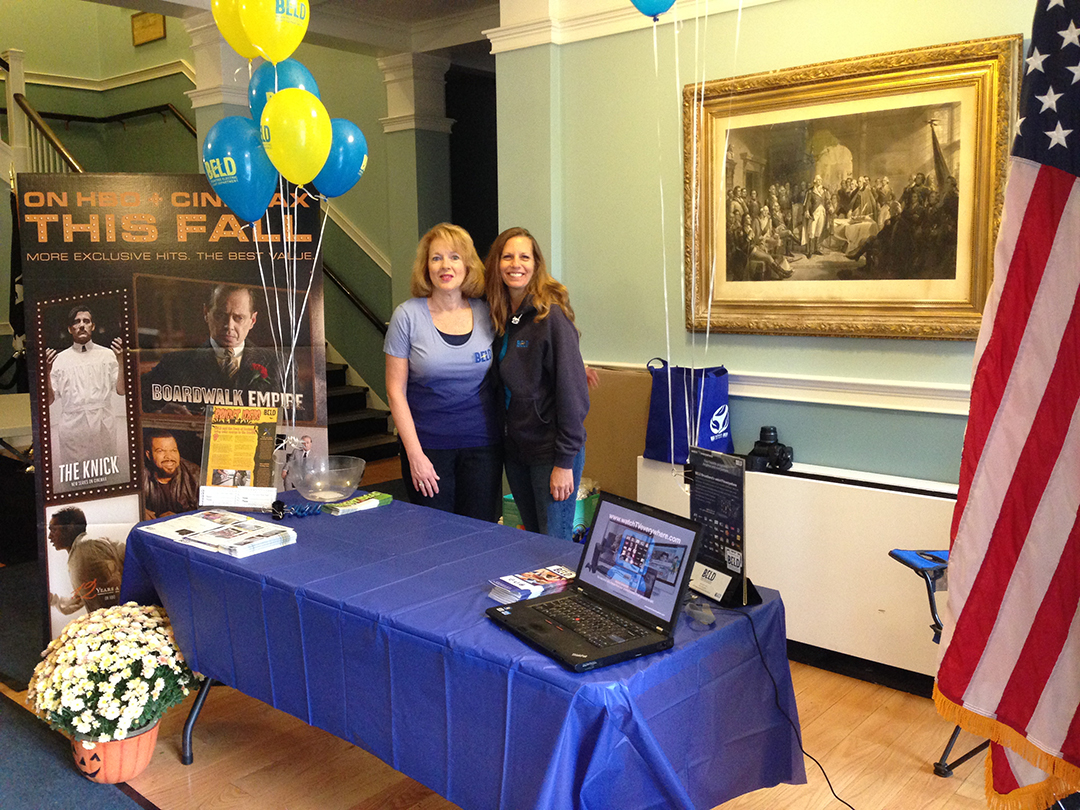 Energy Advisor Ruth Slater serves up some free apple cider 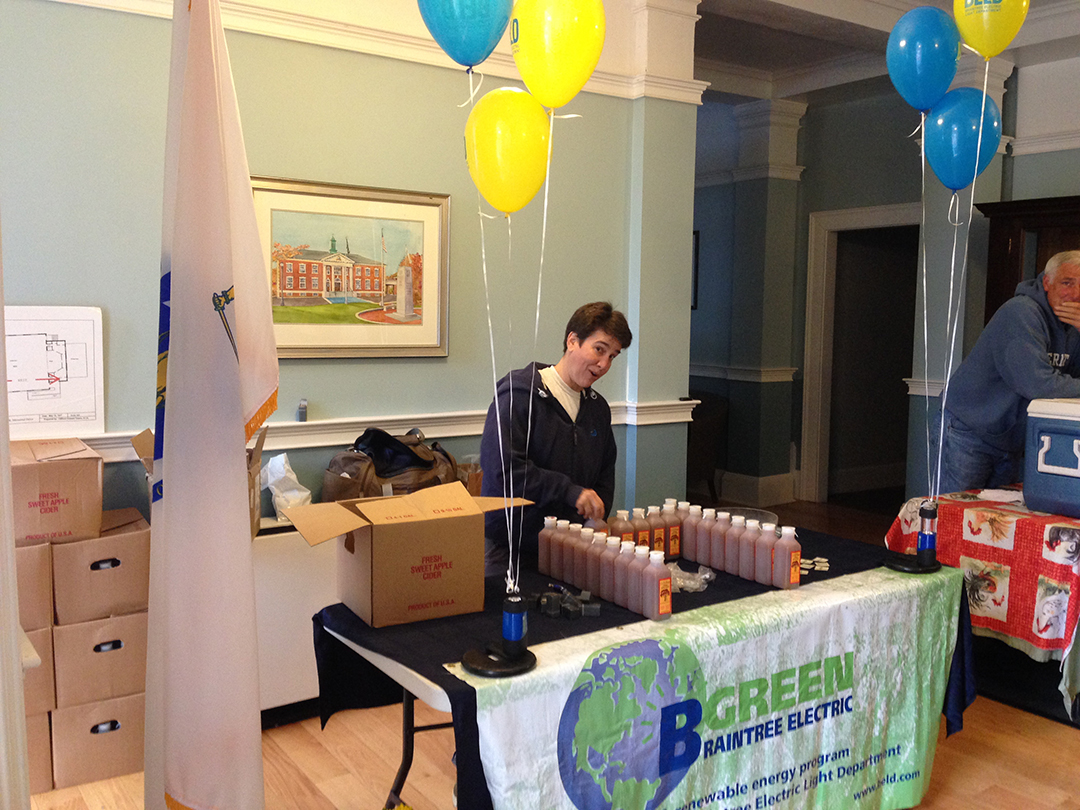 Festive giveaways at the senior breakfast  ##SHARELINKS##
|
|
Belmont Light is one of 2,000 locally owned utilities in the country celebrating Public Power Week during the week of October 4 through October 10. Public Power Week is an annual event sponsored by the American Public Power Association (APPA) to celebrate the benefits of hometown, community-owned electric utilities like Belmont Light. This year marks the 29th annual Public Power Week celebration. "We are fortunate to have a community-owned electric system in Belmont which provides safe, reliable power," General Manager Jim Palmer said. "Public Power Week reminds our customers that we are a part of an American tradition that allows local residents to make important decisions about their public power services."
"Our homes and businesses require electricity 24 hours a day, seven days a week, 365 days a year, and we are always there to provide that power," General Manager Palmer continued. "The availability of safe, reliable electricity is a major factor in helping our community prosper."
Belmont Light has a 117-year history of customer satisfaction, reliability, and public service. Public Power Week is one way to celebrate its long-standing service to Belmont. As part of the celebration, Belmont Light representatives will be at the Farmer's Market and the Belmont Senior Center during the month of October and will be distributing energy saving information and materials to Belmont residents.
##SHARELINKS##
|
|
Peabody Municipal Light Plant (PMLP) is celebrating Public Power Week, October 4–10, along with more than 2,000 other community-owned, not-for-profit electric utilities that collectively provide electricity to 48 million Americans. "Public Power Week celebrates the reliable, affordable electricity that PMLP provides to our community," states Glenn Trueira, PMLP Manager. "PMLP is committed to the protection of our environment and to the welfare and safeguard of our community. Our service is reliable and safe because of the pride public power takes in Peabody and South Lynnfield in serving our friends and neighbors."
With one of the most modern and reliable electric distribution facilities in New England, PMLP’s electric rates are traditionally among the lowest in Massachusetts. Unlike most municipally owned utilities, Peabody has the ability to generate its own power, when necessary, to help safeguard against widespread power outages. PMLP serves about 22,000 residential customers and over 4,000 commercial, industrial, and municipal customers in Peabody and South Lynnfield.
"Public power puts the people of Peabody and South Lynnfield first, and Public Power Week gives us the chance to emphasize the advantages of providing locally owned power to our citizens." said Commission Chairman Thomas Paras. "PMLP is proud to have served the community for more than 124 years."
Peabody Municipal Light Plant invites our customers to participate in the Annual PMLP Bulb Sale Saturday, October 10, 2015, from 9 a.m. to 12 p.m. at 201 Warren Street Ext., Peabody, when customers can purchase new energy efficient LED bulbs at very low costs. Please visit our office or website at www.pmlp.com the week of October 5, 2015, for a list of prices for bulbs that will be sold. Supplies are limited; maximum of (10) bulbs per residential account. Bulbs will be offered on a "first come, first served" basis. You must present your license or light bill to purchase bulbs.
During Public Power Week, PMLP would like to thank our employees for their dedication and continued hard work in providing Peabody and South Lynnfield customers with reliable electrical service 24/7 during 2015!
To learn more about PMLP and the services we provide, please call 978.531.5975 or visit our website at www.pmlp.com.
##SHARELINKS##
|
